
2025
Analysis and recommendations to improve the effectiveness, coherence, and relevance of U.S. federal rural policy

The Reimagining Rural Policy initiative provides analysis and recommendations to improve the effectiveness, coherence, and relevance of U.S. federal rural policy.
 Current federal policy is ill-suited to successfully enable U.S. rural communities to meet the opportunities and challenges of the 21st century. Rural America is diverse: racially, demographically, geographically, and economically. Federal policy must modernize and evolve new approaches if it is to leverage the unique assets of different rural communities, maximize its support for local leaders and local solutions, ensure decisionmaking and economic benefits are equitably shared, and measure and improve community-level outcomes.
Current federal policy is ill-suited to successfully enable U.S. rural communities to meet the opportunities and challenges of the 21st century. Rural America is diverse: racially, demographically, geographically, and economically. Federal policy must modernize and evolve new approaches if it is to leverage the unique assets of different rural communities, maximize its support for local leaders and local solutions, ensure decisionmaking and economic benefits are equitably shared, and measure and improve community-level outcomes.
Through analysis, convenings, and direct engagement with policymakers and rural stakeholders, the project shapes a new policy discourse on federal leadership to promote equitable rural development. It advances targeted, evidence-based policy solutions to create the conditions for improved resilience, well-being, and equity in rural communities.
Twenty-first century shifts in the national and global economy, demographics, and the climate are challenging rural and small-town America. These shifts also offer opportunity, but the capability of rural areas to strengthen their resilience and prosperity is often hampered by lower levels of community capacity, poor connectivity to regional partners and markets, and a history of marginalization due to race and class.
Bright spots across the country suggest that achieving equitable, healthy rural communities is possible. Realizing this renewal at scale requires flexible, consistent, place-based investment customized to local contexts and solutions, especially given the diversity in rural populations, geographies, and economies.
Current federal resources for equitable rural development are fragmented and incoherent, spread across more than 400 programs, 13 departments, and 50 offices and suboffices, making it difficult for rural communities to identify and access the resources appropriate for their needs. No overarching national rural policy or strategy currently exists.
Federal resources offer limited support for pre-development activities, technical assistance, and capacity-building, and are not easily packaged to effectively support holistic, locally led development. The dominant reliance on financing rather than grants, and requirements such as matching funds, put many programs out of reach of the most vulnerable communities.
These core themes have guided the analysis and recommendations of the initiative’s launch report and its subsequent analysis on new federal initiatives and proposals such as the Rural Partners Network, the Recompete pilot program, and the Rural Partnership Program, as well as other opportunities available through the American Rescue Plan Act, the Bipartisan Infrastructure Law, the CHIPs and Science Act, and the Inflation Reduction Act.
The Brookings Institution is a nonprofit organization devoted to independent research and policy solutions. Its mission is to conduct high-quality, independent research and, based on that research, to provide innovative, practical recommendations for policymakers and the public. The conclusions and recommendations of any Brookings publication are solely those of its author(s), and do not reflect the views of the Institution, its management, or its other scholars or co-authors.
Support for this research was provided by the Robert Wood Johnson Foundation. The views expressed here do not necessarily reflect the views of the Foundation.
Brookings is committed to quality, independence, and impact in all of its work. Activities supported by its donors reflect this commitment and the analysis and recommendations are solely determined by the scholars.
In this joint Brookings-AEI event series, Anthony F. Pipa and Brent Orrell converse with authors of recent research on the unique challenges and opportunities facing rural America.
2025
The Brookings Institution, Washington DC
Wednesday, 1:30 pm - 3:00 pm EST
2025
The Brookings Institution, Washington DC
Thursday, 3:00 pm - 4:30 pm EDT
2025
AEI, Washington DC
Wednesday, 12:00 pm - 1:30 pm EST
2024
The Institute for Social Research, Ann Arbor MI
Wednesday, 4:00 pm - 5:00 pm EDT
2024
AEI, Washington DC
Monday, 4:00 pm - 5:30 pm EDT
2024
AEI, Washington DC
Monday, 12:45 pm - 1:45 pm EDT
2024
The Brookings Institution, Washington DC
Friday, 1:00 pm - 2:30 pm EDT
2024
Online only
Thursday, 10:00 am - 11:30 am EDT
2024
AEI, Washington DC
Thursday, 4:00 pm - 5:30 pm EDT
2024
The Brookings Institution, Washington DC
Thursday, 2:00 pm - 3:30 pm EST
2024
Online
Thursday, 1:00 pm - 2:30 pm EST

Anthony F. Pipa, Adam Aley
December 2, 2025

Anthony F. Pipa, Heather M. Stephens, Zoe Swarzenski, David Nason
September 2, 2025

Joseph W. Kane, Anthony F. Pipa
July 8, 2025
2025
Online only
Wednesday, 3:30 pm - 4:30 pm EST

Anthony F. Pipa, Heather M. Stephens, David Nason, Zoe Swarzenski
January 13, 2025

Anthony F. Pipa, Adam Aley
August 6, 2025

Anthony F. Pipa, Zoe Swarzenski
November 19, 2024

Anthony F. Pipa, Zoe Swarzenski
October 31, 2024
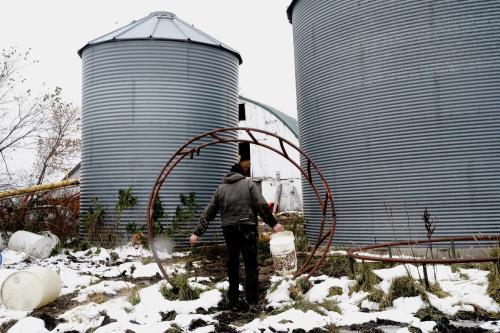
Anthony F. Pipa
October 28, 2024

Anthony F. Pipa
May 26, 2024

Anthony F. Pipa, A.J. Rodriguez, Stan Veuger
March 27, 2024

Anthony F. Pipa, Elise Pietro
December 18, 2023

Anthony F. Pipa, Zoe Swarzenski, Sam Heintz
October 4, 2023

Anthony F. Pipa, Zoe Swarzenski
August 4, 2023

Anthony F. Pipa
July 24, 2023

Anthony F. Pipa, Laura Landes, Zoe Swarzenski
May 31, 2023
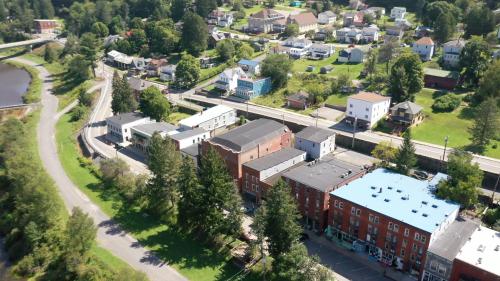
Anthony F. Pipa
May 1, 2023

Anthony F. Pipa
April 26, 2023

Anthony F. Pipa
April 10, 2023

Anthony F. Pipa
December 27, 2022
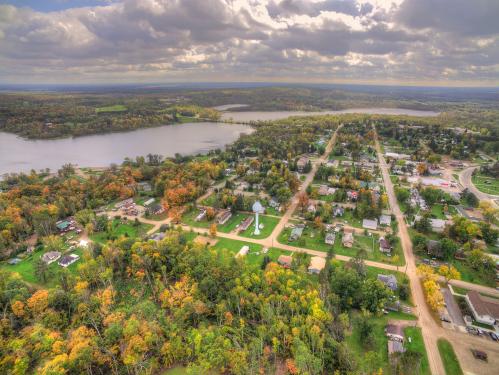
Anthony F. Pipa, Natalie Geismar
December 22, 2022

Anthony F. Pipa, Zoe Swarzenski
September 29, 2022

Anthony F. Pipa, Heather M. Stephens, Natalie Geismar
June 3, 2022

Anthony F. Pipa, Natalie Geismar
December 22, 2021

Anthony F. Pipa, Natalie Geismar
November 15, 2021
2021
Online only
Wednesday, 1:00 pm - 2:15 pm EDT
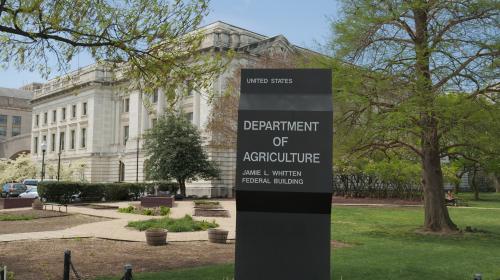
Anthony F. Pipa, Natalie Geismar
June 24, 2021

Anthony F. Pipa, Natalie Geismar
June 22, 2021

Anthony F. Pipa, Natalie Geismar
March 18, 2021

Anthony F. Pipa, Natalie Geismar
November 19, 2020

Anthony F. Pipa, Natalie Geismar
November 19, 2020

Katharine Ferguson, Anthony F. Pipa
June 11, 2020
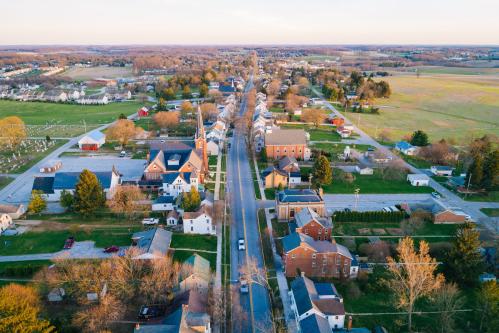
Katharine Ferguson, Anthony F. Pipa, Natalie Geismar
April 14, 2020
The Reimagine Rural podcast, launched in November 2022, provides a fresh perspective on the story of rural America—a story not of disempowerment and dependence but of innovators and collaborators helping their communities adapt to social and economic shifts.
In the podcast, Tony Pipa visits rural towns across America, listening as local people tell the story of how they are enacting positive change in their communities and learning how public investment in rural people and places can lead to increased and equitable prosperity.
The podcast is proud to have won an APEX Award in 2024 and 2025.

Anthony F. Pipa
December 10, 2025

Anthony F. Pipa, Nicol Turner Lee
December 10, 2025
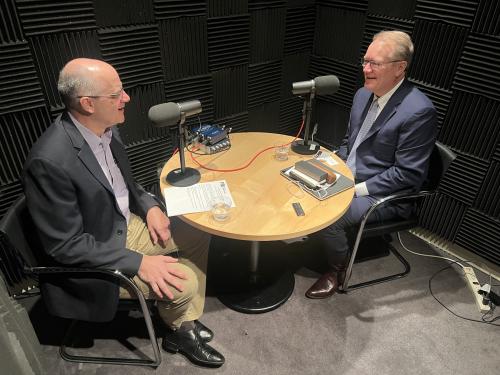
Anthony F. Pipa, Tom Halverson
December 2, 2025

Anthony F. Pipa
November 12, 2025

Anthony F. Pipa, Scott Andes
November 12, 2025

Anthony F. Pipa
October 21, 2025

Anthony F. Pipa, Rachel Perić
October 21, 2025

Anthony F. Pipa
September 30, 2025
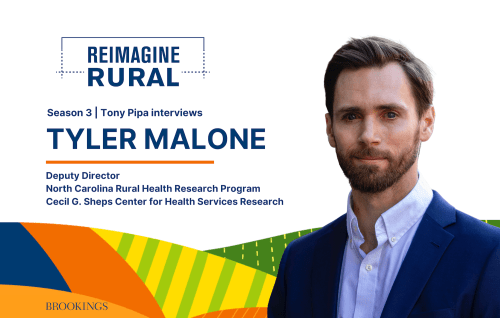
Anthony F. Pipa, Tyler Malone
September 30, 2025
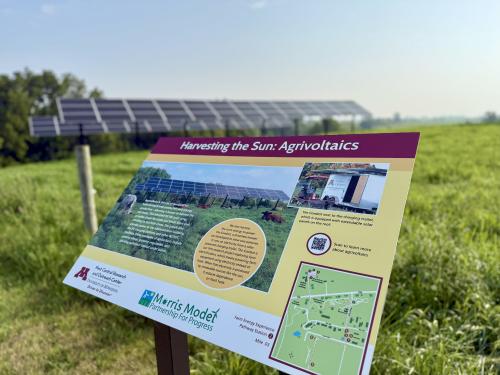
Anthony F. Pipa
September 9, 2025
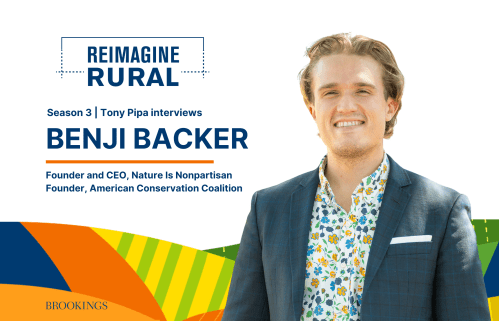
Anthony F. Pipa, Benji Backer
September 9, 2025

Anthony F. Pipa
August 19, 2025
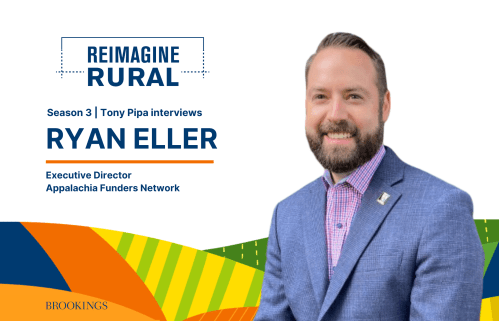
Anthony F. Pipa, Ryan Eller
August 19, 2025

Anthony F. Pipa
July 29, 2025

Anthony F. Pipa
July 29, 2025
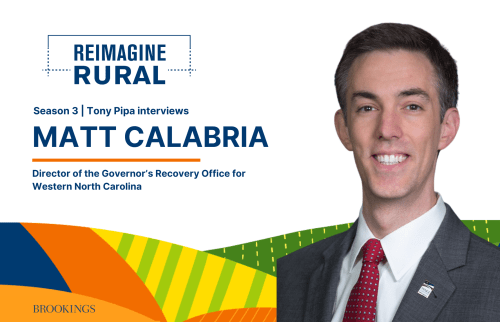
Anthony F. Pipa, Matt Calabria
July 30, 2025

July 22, 2025
Related Content

Amy Liu, Brad McDearman, Xavier de Souza Briggs, Mark Muro, Anthony F. Pipa, Adie Tomer, Jennifer S. Vey +2 more
June 27, 2022

Mark Muro, Robert Maxim, Anthony F. Pipa, Yang You, Colleen Dougherty
November 23, 2021

Tracy Hadden Loh, Anthony F. Pipa
August 11, 2020